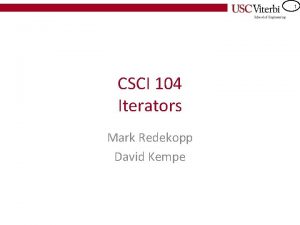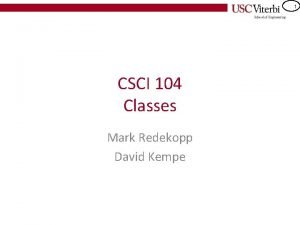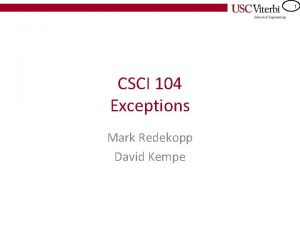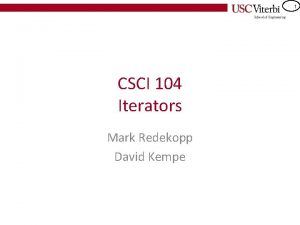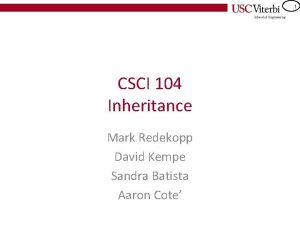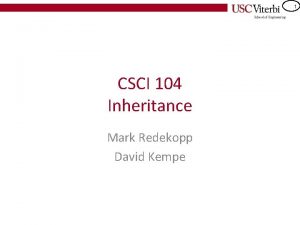1 CSCI 104 Templates Mark Redekopp David Kempe











- Slides: 11

1 CSCI 104 Templates Mark Redekopp David Kempe Sandra Batista Aaron Cote’

2 Function Templates • Example reproduced from: http: //www. cplus. com/d oc/tutorial/templates/ • Consider a max() function to return the max of two int's • But what about two double's or two strings • Define a generic function for any type, T • Can then call it for any type, T, or let compiler try to implicitly figure out T int max(int a, int b) { if(a > b) return a; else return b; } double max(double a, double b) { if(a > b) return a; else return b; } Non-Templated = Multiple code copies template<typename T> T max(const T& a, const T& b) { if(a > b) return a; else return b; } int main() { int x = max<int>(5, 9); //or x = max(5, 9); // implicit max<int> call double y = max<double>(3. 4, 4. 7); // y = max(3. 4, 4. 7); } Templated = One copy of code

3 Motivating Example • Suppose we’ve built a list to store integers • But what if we want a list of double’s or string's or other objects • We would have to define the same code but with different types – What a waste! • Enter C++ Templates – Allows the one set of code to work for any type the programmer wants – The type of data becomes a parameter #ifndef LIST_INT_H #define LIST_INT_H struct Int. Item { int val; Int. Item* next; }; class List. Int{ public: List. Int(); // Constructor ~List. Int(); // Destructor void push_back(int newval); . . . private: Int. Item* head_; }; #endif #ifndef LIST_DBL_H #define LIST_DBL_H struct Double. Item { double val; Double. Item* next; }; class List. Double{ public: List. Double(); // Constructor ~List. Double(); // Destructor void push_back(double newval); . . . private: Double. Item* head_; }; #endif

4 Templates • Allows the type of variable in a class or function to be a parameter specified by the programmer • Compiler will generate separate class/struct code versions for any type desired (i. e instantiated as an object) – LList<int> my_int_list causes an ‘int’ version of the code to be generated by the compiler – LList<double> my_dbl_list causes a ‘double’ version of the code to be generated by the compiler // declaring templatized code template <typename T> struct Item { T val; Item<T>* next; }; template <typename T> class LList { public: LList(); // Constructor ~LList(); // Destructor void push_back(T newval); . . . private: Item<T>* head_; }; // Using templatized code // (instantiating templatized objects) int main() { LList<int> my_int_list; LList<double> my_dbl_list; my_int_list. push_back(5); my_dbl_list. push_back(5. 5125); double x = my_dbl_list. pop_front(); int y = my_int_list. pop_front(); return 0; }

5 Template Mechanics (2) • Writing a template – Precede class with: template <typename T> – Use T or other identifier where you want a generic type – Precede the definition of each function with template <typename T> – In the scope portion of the class member function, add <T> – Since Item and LList are now templated, you can never use Item and LList alone • You must use Item<T> or LList<T> #ifndef LIST_H #define LIST_H template <typename T> struct Item { T val; Item<T>* next; }; template <typename T> class LList{ public: LList(); // Constructor ~LList(); // Destructor void push_back(T newval); T& at(int loc); private: Item<T>* head_; }; template<typename T> LList<T>: : LList() { head_ = NULL; } template<typename T> LList<T>: : ~LList() { } template<typename T> void LList<T>: : push_back(T newval) {. . . } #endif

6 Exercise • Recall that maps/dictionaries store key, value pairs – Example: Map student names to their GPA • How many key, value type pairs are there? – string, int – int, double – Etc. • Would be nice to create a generic data structure • Define a Pair template with two generic type data members "Billy Bruin" "Tommy Trojan" 2. 5 "Helga Harvard" 3. 7 "Daisy Duck" 2. 5 4. 3

7 Another Example • A pair struct: template<typename T 1, typename T 2> struct pair { T 1 first; T 2 second; pair(const T 1& f, const T 2& s); }; template<typename T 1, typename T 2> pair<T 1, T 2>: : pair( const T 1& f, const T 2& s); : first(f), second(s) { }

8 Templates • Usually we want you to write the class definition in a separate header file (. h file) and the implementation in a. cpp file • Key Fact: Templated classes must have the implementation IN THE HEADER FILE! • Corollary: Since we don't compile. h files, you cannot compile a templated class separately • Why? Because the compiler would have no idea what type of data to generate code for and thus what code to generate #ifndef LIST_H #define LIST_H template <typename T> struct Item { T val; Item<T>* next; }; template <typename T> class LList{ public: LList(); // Constructor ~LList(); // Destructor void push_back(T newval); private: Item<T>* head_; }; #endif List. h #include "List. h" template<typename T> LList<T>: : push_back(T newval) { if(head_ = NULL){ head_ = new Item<T>; // how much memory does an Item // require? } } List. cpp

9 Templates • The compiler will generate code for the type of data in the file where it is instantiated with a certain type Main. cpp #include "List. h" int main() { LList<int> my_int_list; LList<double> my_dbl_list; my_int_list. push_back(5); my_dbl_list. push_back(5. 5125); double x = my_dbl_list. pop_front(); int y = my_int_list. pop_front(); return 0; } // Compiler will generate code for LList<int> when compiling main. cpp #ifndef LIST_H #define LIST_H template <typename T> struct Item { T val; Item<T>* next; }; template <typename T> class LList{ public: LList(); // Constructor ~LList(); // Destructor void push_back(T newval); T& at(int loc); private: Item<T>* head_; }; template<typename T> LList<T>: : LList() { head_ = NULL; } template<typename T> LList<T>: : ~LList() { } template<typename T> void LList<T>: : push_back(T newval) {. . . } #endif List. h

10 Templates & Inheritance • For various reasons the compiler may have difficulty resolving members of a templated base class • When accessing members of a templated base class provide the full scope or precede the member with this-> #include "llist. h" template <typename T> class Stack : private LList<T>{ public: Stack(); // Constructor void push(const T& newval); T const & top() const; }; template<typename T> Stack<T>: : Stack() : LList<T>() { } template<typename T> void Stack<T>: : push(const T& newval) { // call inherited push_front() push_front(newval); // may not compile LList<T>: : push_front(newval); // works this->push_front(newval); // works } template<typename T> void Stack<T>: : push(const T& newval) { // assume head is a protected member if(head) return head->val; // may not work if(LList<T>: : head) // works return LList<T>: : head->val; if(this->head) // works return this->head->val; }

11 "typename" & Nested members • For various reasons the compiler will have difficulty resolving nested types of a templated class whose template argument is still generic (i. e. T vs. int) • Precede the nested type with the keyword 'typename' when you are – Not in the scope of the templated class AND – The template type is still generic • Why? Research template specialization and read https: //en. wikipedia. org/wiki/T ypename #include <iostream> #include <vector> using namespace std; template <typename T> class Stack { public: void push(const T& newval) { data. push_back(newval); } T& top(); private: When the template std: : vector<T> data; type is still generic }; and you scope a nested type, precede with typename template <typename T> T& Stack<T>: : top() { vector<T>: : iterator it = data. end(); // bad typename vector<T>: : iterator it = data. end(); //good return *(it-1); } When the template type is specific there int main() { is no need to use Stack<int> s 1; typename vector<int>: : iterator it; s 1. push(1); s 1. push(2); s 1. push(3); cout << s 1. top() << endl; return 0; }








